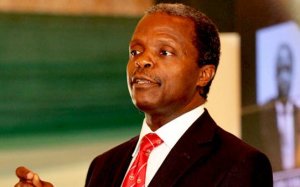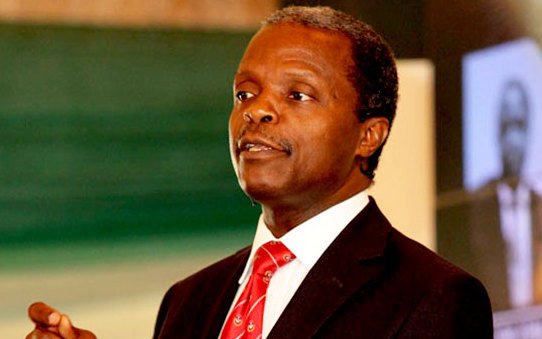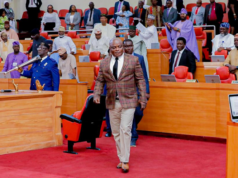The Vice President-elect, Yemi Osinbajo, on Wednesday said Nigeria’s local and foreign debts now stand at $60 billion.
He stated this in Abuja while declaring open the two-day Policy Dialogue on the implementation of the Agenda for Change organised by the Policy, Research and Strategy Directorate of the APC Presidential Campaign Council.
Mr. Osinbajo, who painted a gloomy picture of the nation’s economy, also lamented that most of the states cannot pay salaries on account of the country’s dwindling resources.
He said, “Local and international debt stands at US$60 billion. Our Debt servicing bill for 2015 is N953.6 billion, 21 per cent of our Budget. On account of severely dwindled resources, over two-thirds of the states in Nigeria owe salaries. Federal institutions are not in much better shape. Today, the nation borrows to fund recurrent expenditure.
“This is also against the backdrop of a highly unequal society in which, by some reckoning, the largest chunk of the benefits of our national wealth accrues to a small percentage of our population. Our manifesto offered a vision of shared prosperity and socio-economic inclusion for all Nigerians that leaves no one behind in the pursuit of a prosperous and fulfilling life.
Mr. Osinbajo, who pointed out that an estimated 110 million of the country’s population are living in poverty, said the figure confirmed the biggest national problem is extreme poverty.
He added that of big concern to the government is the economy, which according to him is currently at its worst moment in history.
He said the need to effectively tackle these challenges necessitated the need to interrogate various positions and propositions before a wider audience and launch a robust public conversation on policy directions and priorities that will help inform the administration’s approach in the next four years.
Mr. Osinbajo said the dialogue exemplified the sort of consultative and consensual approach to policy making that the APC and the new administration intend to model in office.
He said, “The figures of extreme poverty in our society- 110 million by current estimates- makes it clear that our biggest national problem is the extreme poverty of the majority. Thus, no analysis is required to conclude that dealing with poverty and its implications is a priority. We are concerned that our economy is currently in perhaps its worst moment in history.
The vice president-elect also assured that the APC federal administration, which will be inaugurated on May 29, would pay attention to education, especially teaching methods by teachers.
He said the administration would make the training of teachers a priority even as it plans to review school curricular and partner the civil society in the quest for qualitative education for students.
The Head of the Policy, Research and Strategy Directorate of the APC Presidential Campaign Organisation, Kayode Fayemi, in his address, explained that the Dialogue was convoked in order to demonstrate to Nigerians that the APC government would seriously tackle the issues affecting their lives.
Mr. Fayemi, a former governor of Ekiti State, noted that the party ran a unique campaign that was issues-based and principle-centred during the last general elections.
He said the APC believed that the stakes had never been higher in the country’s history of democratic politics and that a new approach was required.
This new approach, he stressed “was evident in our disciplined refusal to depart from a laser-keen focus on the real issues affecting the Nigerian people rather than traffic in distractive rhetoric.”
He added, “Our approach focused on the electorate as being worthy of serious and sincere engagement and sought to bring clarity to the issues at stake.
“The outcome of the historic polls attests to the fact that not only did the right candidate and party triumph, the right ideas and the right approach also prevailed.
“The majority of Nigerians demonstrated their readiness to be taken seriously as voters, and duly rewarded the party that sincerely addressed their pressing issues.
“This commitment to seriously tackling the themes that affect the lives of our people remains a cardinal principle of our pact with Nigerians and informs the convening of this policy dialogue.”
Mr. Fayemi restated the need to evolve new strategies that would guide the new administration in its delivery of democratic dividends so that it could take off on a positive note and positioned in a way to sustain its pre-election popularity.







